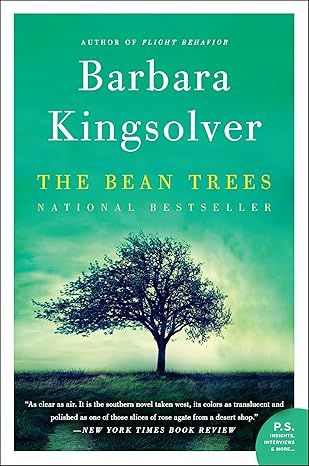The Bean Trees Anniversary Edition: A Novel
4.4
-
11,504 ratings
"The Bean Trees is the work of a visionary. . . . It leaves you open-mouthed and smiling." — Los Angeles Times
A bestseller that has come to be regarded as an American classic, The Bean Trees is the novel that launched Barbara Kingsolver's remarkable literary career.
It is the charming, engrossing tale of rural Kentucky native Taylor Greer, who only wants to get away from her roots and avoid getting pregnant. She succeeds, but inherits a three-year-old Native American girl named Turtle along the way, and together, from Oklahoma to Arizona, half-Cherokee Taylor and her charge search for a new life in the West. Hers is a story about love and friendship, abandonment and belonging, and the discovery of surprising resources in seemingly empty places.
This edition includes a P.S. section with additional insights from the author, background material, suggestions for further reading, and more.
Kindle
$3.99
Available instantly
Audiobook
$0.00
with membership trial
Hardcover
$2.41
Paperback
$12.19
Ships from
Amazon.com
Payment
Secure transaction
ISBN-10
0060175796
ISBN-13
978-0060175795
Print length
272 pages
Language
English
Publisher
Harper
Publication date
January 19, 1998
Dimensions
5.5 x 1.01 x 8.25 inches
Item weight
14.5 ounces
Popular highlights in this book
I had decided early on that if I couldn’t dress elegant, I’d dress memorable.
Highlighted by 1,237 Kindle readers
Mi’ija, in a world as wrong as this one, all we can do is to make things as right as we can.
Highlighted by 840 Kindle readers
A night-blooming cereus, Virgie Mae explained. The flowers open for only one night of the year, and then they are gone.
Highlighted by 718 Kindle readers
Product details
ASIN :
B000QUCO12
File size :
2956 KB
Text-to-speech :
Enabled
Screen reader :
Supported
Enhanced typesetting :
Enabled
X-Ray :
Enabled
Word wise :
Enabled
Editorial reviews
From Publishers Weekly
Feisty Marietta Greer changes her name to "Taylor" when her car runs out of gas in Taylorville, Ill. By the time she reaches Oklahoma, this strong-willed young Kentucky native with a quick tongue and an open mind is catapulted into a surprising new life. Taylor leaves home in a beat-up '55 Volkswagen bug, on her way to nowhere in particular, savoring her freedom. But when a forlorn Cherokee woman drops a baby in Taylor's passenger seat and asks her to take it, she does. A first novel, The Bean Trees is an overwhelming delight, as random and unexpected as real life. The unmistakable voice of its irresistible heroine is whimsical, yet deeply insightful. Taylor playfully names her little foundling "Turtle," because she clings with an unrelenting, reptilian grip; at the same time, Taylor aches at the thought of the silent, staring child's past suffering. With Turtle in tow, Taylor lands in Tucson, Ariz., with two flat tires and decides to stay. The desert climate, landscape and vegetation are completely foreign to Taylor, and in learning to love Arizona, she also comes face to face with its rattlesnakes and tarantulas. Similarly, Taylor finds that motherhood, responsibility and independence are thorny, if welcome, gifts. This funny, inspiring book is a marvelous affirmation of risk-taking, commitment and everyday miracles. Copyright 1988 Reed Business Information, Inc.
From Library Journal
This debut novel follows the gritty, outspoken Taylor Greer, who leaves her native Kentucky to head west. She becomes mother to an abandoned baby and, when her jalopy dies in Tucson, is forced to work in a tire garage and to room with a young, battered divorcee who also has a little girl. With sisterly counsel and personal honesty, the two face their painful lot (told in ponderous detail). The blue-collar setting, described vibrantly, often turns violent, with baby beatings, street brawls, and drug busts. Despite the hurt and rage, themes of love and nurturing emerge. A refreshingly upbeat, presentable first effort by an author whose subsequent novels will probably generate more interest than this one. Edward C. Lynskey, Documentation, Atlantic Research Corp., Alexandria, Va. Copyright 1988 Reed Business Information, Inc.
From the Back Cover
Clear-eyed and spirited, Taylor Greer grew up poor in rural Kentucky with the goals of avoiding pregnancy and getting away. But when she heads west with high hopes and a barely functional car, she meets the human condition head-on. By the time Taylor arrives in Tucson, Arizona, she has acquired a completely unexpected child, a three-year-old American Indian girl named Turtle, and must somehow come to terms with both motherhood and the necessity for putting down roots. Hers is a story about love and friendship, abandonment and belonging, and the discovery of surprising resources in apparently empty places.
Read more
Sample
The One to Get Away
I have been afraid of putting air in a tire ever since I saw a tractor tire blow up and throw Newt Hardbine's father over the top of the Standard Oil sign. I'm not lying. He got stuck up there. About nineteen people congregated during the time it took for Norman Strick to walk up to the Courthouse and blow the whistle for the volunteer fire department. They eventually did come with the ladder and haul him down, and he wasn't dead but lost his hearing and in many other ways was never the same afterward. They said he overfilled the tire. Newt Hardbine was not my friend, he was just one of the big boys who had failed every grade at least once and so was practically going on twenty in the sixth grade, sitting in the back and flicking little wads of chewed paper into my hair. But the day I saw his daddy up there like some old overalls slung over a fence, I had this feeling about what Newt's whole life was going to amount to, and I felt sorry for him. Before that exact moment I don't believe I had given much thought to the future.
My mama said the Hardbines had kids just about as fast as they could fall down the well and drown. This must not have been entirely true, since they were abundant in Pittman County and many survived to adulthood. But that was the general idea.
Which is not to say that we, me and Mama, were any better than Hardbines or had a dime to our name. If you were to look at the two of us, myself and Newt side by side in the sixth grade, you could have pegged us for brother and sister. And for all I ever knew of my own daddy I can't say we weren't,except for Mama swearing up and down that he was nobody I knew and was long gone besides. But we were cut out of basically the same mud, I suppose,just two more dirty-kneed kids scrapping to beat hell and trying to land on our feet. You couldn't have said, anyway, which one would stay right where he was, and which would be the one to get away.
Missy was what everyone called me, not that it was my name, but because when I was three supposedly I stamped my foot and told my own mother not to call me Marietta but Miss Marietta, as I had to call all the people including children in the houses where she worked Miss this or Mister that, and so she did from that day forward. Miss Marietta and later on just Missy.
The thing you have to understand is, it was just like Mama to do that. When I was just the littlest kid I would go pond fishing of a Sunday and bring home the boniest mess of blue-gills and maybe a bass the size of your thumb,and the way Mama would carry on you would think I'd caught the famous big lunker in Shep's Lake that old men were always chewing their tobacco and thinking about. "That's my big girl bringing home the bacon,"she would say, and cook those things and serve them up like Thanksgiving for the two of us.
I loved fishing those old mud-bottomed ponds. Partly because she would be proud of whatever I dragged out, but also I just loved sitting still. You could smell leaves rotting into the cool mud and watch the Jesus bugs walk on the water, their four little feet making dents in the surface but never falling through. And sometimes you'd see the big ones, the ones nobody was ever going to hook, slipping away under the water like dark-brown dreams.
By the time I was in high school and got my first job and all the rest,including the whole awful story about Newt Hardbine which I am about to tell you, he was of course not in school anymore. He was setting tobacco alongside his half-crippled daddy and by that time had gotten a girl in trouble, too, so he was married. It was Jolene Shanks and everybody was a little surprised at her, or anyway pretended to be, but not at him. Nobody expected any better of a Hardbine.
But I stayed in school. I was not the smartest or even particularly outstanding but I was there and staying out of trouble and I intended to finish. This is not to say that I was unfamiliar with the back seat of a Chevrolet. I knew the scenery of Greenup Road, which we called Steam-It-Up Road, and I knew what a pecker looked like, and none of these sights had so far inspired me to get hogtied to a future as a tobacco farmer's wife. Mama always said barefoot and pregnant was not my style. She knew.
It was in this frame of mind that I made it to my last year of high school without event. Believe me in those days the girls were dropping by the wayside like seeds off a poppyseed bun and you learned to look at every day as a prize. You'd made it that far. By senior year there were maybe two boys to every one of us, and we believed it was our special reward when we got this particular science teacher by the name of Mr. Hughes Walter.
Read more
About the authors
Barbara Kingsolver
Barbara Kingsolver was born in 1955 and grew up in rural Kentucky. She earned degrees in biology from DePauw University and the University of Arizona, and has worked as a freelance writer and author since 1985. At various times she has lived in England, France, and the Canary Islands, and has worked in Europe, Africa, Asia, Mexico, and South America. She spent two decades in Tucson, Arizona, before moving to southwestern Virginia where she currently resides.
Her books, in order of publication, are: The Bean Trees (1988), Homeland (1989), Holding the Line: Women in the Great Arizona Mine Strike (1989), Animal Dreams (1990), Another America (1992), Pigs in Heaven (1993), High Tide in Tucson (1995), The Poisonwood Bible (1998), Prodigal Summer (2000), Small Wonder (2002), Last Stand: America's Virgin Lands, with photographer Annie Griffiths (2002), Animal, Vegetable, Miracle: A Year of Food Life (2007), The Lacuna (2009), Flight Behavior (2012), Unsheltered (2018), How To Fly (In 10,000 Easy Lessons) (2020), Demon Copperhead (2022), and coauthored with Lily Kingsolver, Coyote's Wild Home (2023). She served as editor for Best American Short Stories 2001.
Read more
Reviews
Customer reviews
4.4 out of 5
11,504 global ratings
L.D
5
What A Pleasant Surprise!
Reviewed in the United States on May 14, 2014
Verified Purchase
The title of this book caught my attention. I am so glad it did! What a pleasure it was getting to know Taylor! I loved the way the story was told consistently from her viewpoint. . . her 'voice' was heard through-out, even when I thought she 'had it wrong' it was always clear that this was Taylors story, and she would reach her own conclusions, in her own time and in her own way.
The variety of characters was both believable and interesting. I thoroughly enjoyed the use of description in creating and recreating memories and events, It put me right there in the car with Taylor as she traveled cross country. I saw what she saw, and was able to laugh, and cry right along with her.
Lou Ann is an important part of this story. Emotionally she and Taylor are very different, yet together they are the epitome of every female psyche. In truth, they both teach lessons, and what is life, except a process of growth? I applaud the author for keeping me guessing until the very end. . .there was more than one possibility of course and I love a book that isn't predictable. This book is not a 'Love story', but it does examine what the word truly means. It is not a political satire, but it does make one question whether man's governments will ever accomplish the most basic of human needs. It is not a religious book, but it does 'poke fun' at hypocrisy. It does not get bogged down with moralization, but it does tell the stories of people who's lives are molded, by their economic situation in life. It also offers hope that the 'good' can and often does win out over 'evil'.
I am so glad to discover this author, and hope to savor the rest of her books!
Read more
3 people found this helpful
Ratmammy
5
A little girl named Turtle....
Reviewed in the United States on January 27, 2002
Verified Purchase
THE BEAN TREES is a novel about a young woman, Taylor Greer, who leaves her home state of Kentucky to find a life outside of what she knew - growing up to become barefoot and pregnant. She wanted more than that, but she did not really know what she wanted. She finally arrives in Tucson and meets a woman who wants to give Taylor a 3 year old child. Taylor promises to take care of the little girl. Whether the woman is the child's mother, we never do find out. But Taylor does find out right away that something is not right with the child. Turtle, the name Taylor gives the child, does not talk. Taylor also finds bruises over the child's body while giving her a bath. Maybe Taylor has saved this child from a horrible life, but now she is responsible for the welfare of this little Indian american girl. But now what to do? No money and no job, and she's got a kid she never planned on having. Taylor and Turtle end up in a small town in Arizona and after meeting several nice people who help them out, they end up living with a gal named Lou Ann, who has her own story to tell. The book is intertwined with the stories of both women so we get to know them both very well. Along the way they meet and get involved with a hispanic couple, Estevan and Esperanza. They are from central America, and their story is a mystery, except we know Esperanza knows very little English, and Estevan was an English teacher in his home land. The four of them, along with little Turtle, become good friends, and soon Turtle is responding to the love she is getting from her new family. But there is still the mystery of what really happened to little Turtle.... THE BEAN TREES is the 2nd Barbara Kingsolver novel I have read, THE POISONWOOD BIBLE being the other one. This second novel reads quite differently than POISONWOOD BIBLE did, and I guess one reason is that THE BEAN TREES was written over a decade before. Ms. Kingsolver's skills as a story teller greatly improved between these two novels, but that does not mean THE BEAN TREES is a poorly written book. On the contrary, I found it very well written and enjoyable to read. The feel of both books is very different. While POISONWOOD had the feel of an epic, THE BEAN TREES was a much more simpler novel (being a much shorter novel helped!) I can't say whether one book was better than the other. I liked both equally. What I'm finding I really like about Ms Kingsolver's books is that she is very good at character developement. She knows how to paint a character well enough that I was able to picture right away what these characters were all about. They were not shallow one dimensional people, but people I could care about. Obviously, I am giving THE BEAN TREES a glowing recommendation. It was probably one of the better books I read in 2001.
Read more
130 people found this helpful

Wendeborg
5
The Bean Trees by Barbara Kingsolver
Reviewed in the United States on April 17, 2014
Verified Purchase
This cleverly written, engrossing tale of Marietta/Taylor Greer's escape from her birthplace in Kentucky, and what eventually happens to her in Arizona. The story (and it's a good story) is about family, friendship and our responsibilities as people. To give an example of Kingsolver's style (of which I have long been a fan) her description of Taylor's first stop, a bar in Oklahoma: "..and the black grease on the back of the stove looked like it had been there since the Dawn of Man. The air in there was so hot and stale it felt like I had to breathe it twice to get any oxygen out of it." - p. 21
At this point Taylor is 'given' an Indian baby girl - whom she callsTurtle.
And this, a description of the house she ends up sharing with Lou Ann and her baby Dwayne Rae: "The house was old and roomy, there was plenty of space for Turtle's bed in my room. It was the type of house they called a "rambling bungalow" (the term reminded me somehow of Elvis Presley movies) with wainscoting and steam radiators and about fifty coats of paint on the door frames..." - p. 191
SPOILER ALERT!
Taylor has a job, and gets to know two Guatemalan refugees who are being helped by Mattie, Taylor's boss. Now Taylor is starting to understand the sort of problems other people face, and so when she decides to try to sort out her own legal standing with Turtle, she volunteers to take Estevan and Esperanza with her.
This scene where the Guatemalans are posing as Turtle's natural parents, giving Taylor permission to adopt her, was heart-wrenching: "Esperanza...held her against her chest, rocking back and forth for a very long time with her eyes squeezed shut...the rest of us watched... Here was a mother and her daughter, nothing less. A mother and child - in a world that could barely be bothered with mothers and children - who were going to be taken apart. Everybody believed it." - p. 291
How appropriate for this time!
Read more
33 people found this helpful
Top Barbara Kingsolver titles
View all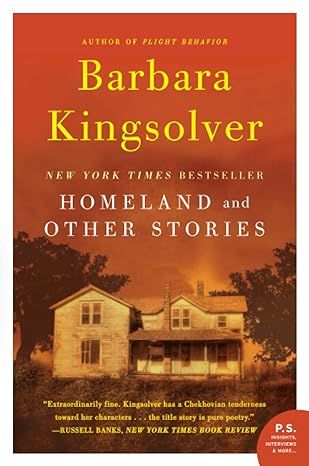
Homeland: And Other Stories
4.2
-
691
$5.24
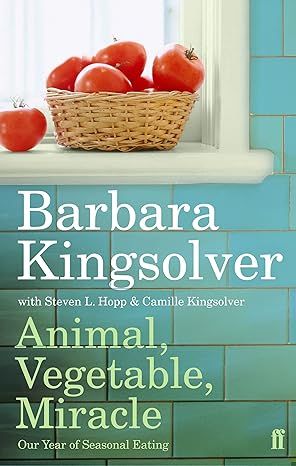
Animal, Vegetable, Miracle: Our Year of Seasonal Eating
4.5
-
2,496
$7.96
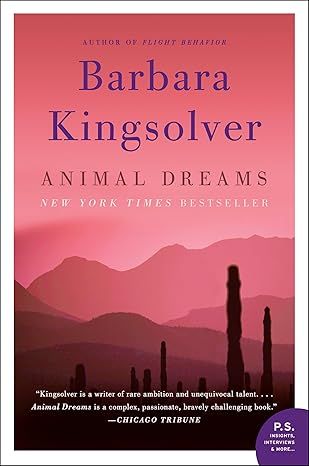
Animal Dreams: A Novel
4.4
-
2,888
$10.49
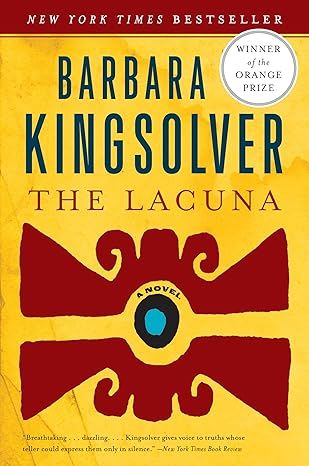
The Lacuna: A Novel (P.S.)
4.4
-
4,450
$1.77
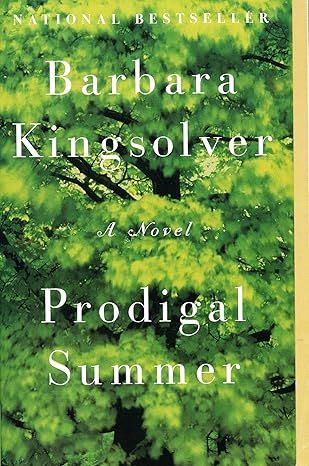
Prodigal Summer: A Novel
4.4
-
6,309
$8.99
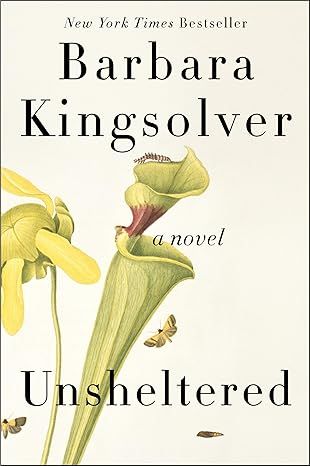
Unsheltered: A Novel
4.2
-
12,750
$5.24
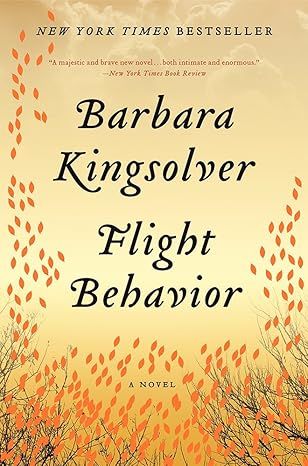
Flight Behavior: A Novel
4.3
-
9,479
$1.84
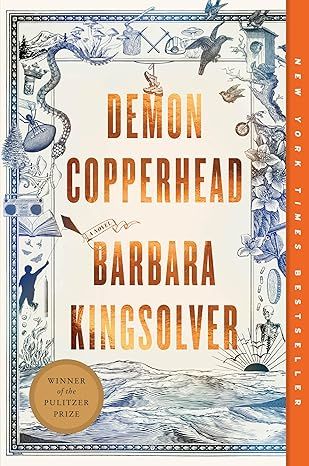
Demon Copperhead: A Novel
4.6
-
110,129
$16.99
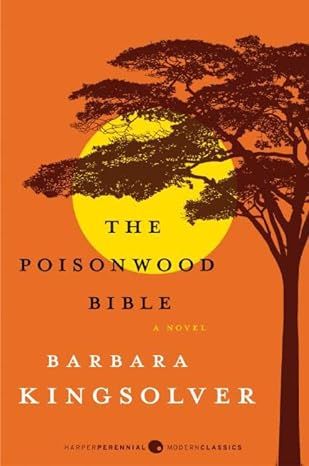
The Poisonwood Bible: A Novel
4.5
-
16,256
$12.69
Similar Books
Best sellers
View all
The Tuscan Child
4.2
-
100,022
$8.39

The Thursday Murder Club: A Novel (A Thursday Murder Club Mystery)
4.3
-
155,575
$6.33

Sapiens: A Brief History of Humankind
4.6
-
140,302
$13.49

The Butterfly Garden (The Collector, 1)
4.3
-
88,556
$9.59

Things We Hide from the Light (Knockemout Series, 2)
4.4
-
94,890
$11.66

The Last Thing He Told Me: A Novel
4.3
-
154,085
$2.99

The Perfect Marriage: A Completely Gripping Psychological Suspense
4.3
-
143,196
$9.47

The Coworker
4.1
-
80,003
$13.48

First Lie Wins: A Novel (Random House Large Print)
4.3
-
54,062
$14.99

Mile High (Windy City Series Book 1)
4.4
-
59,745
$16.19

Layla
4.2
-
107,613
$8.99

The Locked Door
4.4
-
94,673
$8.53
